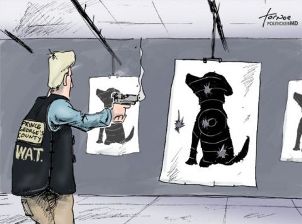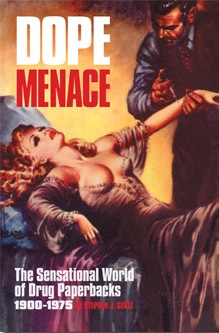The International Narcotics Control Board (INCB) has released its latest annual report on the global drug situation. It calls for increased efforts against marijuana, warns of an increasingly violent drug trade, and worries about the Internet. Critics charge the agency is stuck in the last century.
"Dope Menace" is a visually stunning, very well-informed journey to the heart of America's mid-century obsession with pulp paperbacks, especially those with drug themes. If you have an interest in drugs and popular culture, you're going to want to check this one out.
There is majority support for legal marijuana on the West Coast, according to a new Zogby poll. The East Coast isn't far behind.
Uniformed cops, jail guards, narcs, and assistant police chiefs -- all gone bad this week.
The economic stimulus bill will be stimulating the drug war, too. There's more than $3 billion in there for law enforcement, and much of that is destined for enforcing drug prohibition.
When a Maryland SWAT team raided an innocent mayor's house and killed his dogs, the outrage was palpable. Now, some Maryland legislators have filed a bill that would begin to hold SWAT teams accountable.
Is New Jersey poised to become the next medical marijuana state? The state Senate will vote on it on Monday.
A marijuana decriminalization bill in Washington state was approved by a Senate committee Wednesday, but there has to be similar action in the state House by next week, or it's dead for the session.
The federal budget deficit is reaching astronomical proportions, and the DEA administrator took a $123,000 plane ride to Colombia?!?!
Does meth use equal child abuse? The New Mexico House thinks so.
Events and quotes of note from this week's drug policy events of years past.
Do you read Drug War Chronicle? If so, we need your feedback to evaluate our work and make the case for Drug War Chronicle to funders. We need donations too.
Bush administration holdovers are ordering raids on state-authorized medical marijuana clinics, despite President Obama's pledge to stop them. Please ask the new president and attorney general to take corrective actions sooner rather than later.
"Study: Marijuana Users Less Likely to Get Injured Than Non-Users," "Police Raid Innocent Couple Because Their Son Had a Misdemeanor Marijuana Charge," "Maryland Legislation Seeks to Address Out-of-Control SWAT Raids," "Drug War Protestors Block Traffic Along Mexican Border," "Legalizing Marijuana Doesn't Mean We Have to Legalize Horrible Crimes," "Drug War Logic 101," "Sheriff Lott Gives up on Charging Michael Phelps," "A Failed Drug Strategy Isn't the Only Way DEA Wastes our Money," "Ryan Frederick Update," "Increasing Violence in Mexico is Not a Sign of Progress in the Drug War."
Apply for an internship at DRCNet for this spring (or summer), and you could spend the semester fighting the good fight!
The International Narcotics Control Board (INCB) today released its latest annual report (available on February 20th here) on the global drug situation. The report strongly suggests that the INCB remains stuck in the last century when it comes to drug policy.

INCB brochure
The INCB is the independent, quasi-judicial United Nations agency that monitors compliance with the UN anti-drug conventions, the legal backbone of global drug prohibition. As such, it has generally been very conservative, and despite the rising global clamor for a new approach, this year is no exception.
One of the targets of the INCB's ire this year is marijuana, which the agency says the international community is underestimating. "The international community may wish to review the issue of cannabis," the report said. "Over the years, cannabis has become more potent and is associated with an increasing number of emergency room admissions," the report stated, adding that marijuana is frequently called a "gateway drug."
"In spite of all these facts, the use of cannabis is often trivialized and, in some countries, controls over the cultivation, possession and use of cannabis are less strict than for other drugs," the INCB complained. While some countries are lax on personal use and others allow medical use, public perceptions of the herb "are overlapping and confusing," the agency said.
It was also critical of opiate maintenance therapy and harm reduction programs. Heroin maintenance programs violate the UN conventions, while some harm reduction practices facilitate drug use, the INCB charges.
Another key concern for the INCB was the rise of the Internet in the trafficking of both licit and illicit drugs. "Drug traffickers are among the main users of encryption for Internet messaging and by this means evade law enforcement, coordinate shipments of drugs and launder money," the report warned. "A coordinated, global response is needed to meet this challenge."
The agency also reported that purveyors of chemicals used in the manufacture of illicit drugs are also using the Internet. Sometimes criminals will create fictitious companies or bogus authorizations to import such chemicals, the INCB charged.
But the INCB was also "alarmed" by the development of "rogue" Internet pharmacies. While it granted "that purchasing pharmaceuticals online can be beneficial, especially in areas where hospitals and pharmaceutical services are widely dispersed, [the INCB] is alarmed that 'rogue' pharmacies are encouraging drug abuse among vulnerable groups."
The report called for international action "to address the illegal sale of drugs on Internet pharmacies and web sites." "The Internet is a major problem," said professor Hamid Ghodse, the board's president. "That is why we started three years ago to have contact with Interpol on the issue. There are illicit Internet pharmacies and they do not have natural boundaries."
On the positive side, the INCB, which is charged with monitoring the use of opiate-based pain relievers, said "millions of patients" were suffering unnecessarily and urged governments to "stimulate" the use of such pain relievers." Although the access to controlled medicines, including morphine and codeine, is considered by the World Health Organization (WHO) to be a human right, it is virtually non-existent in over 150 countries," the report said. "The WHO estimates that at least 30 million patients and possibly as many as 86 million annually suffer from untreated moderate to severe pain."
But overall, the report was full of doom and gloom, warning that the global drug trade was expanding and becoming more violent. When assessing blame for this state of affairs, the INCB should look in the mirror, critics said.
"With the release of its annual report today, the International Narcotics Control Board boldly reaffirmed its shameful commitment to politics over science as well as its shocking indifference to the failures and harmful consequences of the global drug prohibition regime," said Ethan Nadelmann, executive director of the Drug Policy Alliance.
"The INCB is the last of the UN drug agencies to still prioritize abstinence-only ideology over evidence-based policies that have proven effective in reducing drug-related harms. Its recommendations regarding substitution treatment, cannabis policy, and harm reduction measures to reduce death, disease, crime and suffering are all at odds with both scientific evidence and evolving policies in many parts of the world," Nadelmann continued. "Perhaps most stunning is the board's failure to consider the crime, violence and corruption as well as over-incarceration and violations of human rights associated with the global drug prohibition regime."
"The tragic irony is that it is the board's inhumane, unjust and irrational policing of the UN drug control system that has created or exacerbated most of the problems outlined in its report," agreed Danny Kushlick of Transform, the British drug policy foundation. "The board is complicit in gifting the illegal drug market to terror groups, paramilitaries and organized criminals, contributing to the political and economic destabilization of producer and transit countries and putting millions at risk of contracting blood-borne viruses. The INCB and the UN Office on Drugs and Crime pose a greater threat to global well-being than drugs themselves."
Nadelmann pointed out that there are alternatives. "Coming on the heels of the report released last week by the Latin American Commission on Drugs and Democracy, which came to very different conclusions with its call for a paradigm shift in global drug control policy, the INCB report seems sadly irrelevant to the most important issues in drug control today," he said. "Now that the Obama administration shows signs of joining with other nations in emphasizing health and science over anti-drug rhetoric and ideology, the INCB may soon be faced with the choice of evolving or going out of business. It will soon be one hundred years since the International Opium Congress convened in Shanghai in 1909, thereby initiating the global drug control system. An appropriate memorial would be the abolition of the INCB."
back to top
For anyone with an interest in drugs, kitsch, and popular culture, "Dope Menace" is going to be a real pleasure -- and probably something of an education. Lavishly illustrated with more than a hundred pulp paperback book covers, many of them gloriously lurid, their cover text tawdry and sensational, the book offers a delicious, delirious excursion to the far shores of post-World War II pop culture, a place where the sordid mixed with the forbidden, and sexual anxiety -- or was it curiosity? -- permeated almost everything.
"Love Addict" screamed the title of one pulp paperback. "She came offering her body... for a shot of heroin!" The cover enticed, showing an attractive woman lifting her black dress high enough to reveal the pale flesh of her thigh above the top of her black stockings as she prepares to inject herself with the needle she holds in one hand while a man smoking a cigarette reclines on a bed watching. "A novel of today's Sex-Ravished, Dope-Hungry Girls."
Gertz knows his pulp. A respected authority on antiquarian books, he also contributed to "Sin-A-Rama," an award-winning visual history of sleaze paperbacks from the 1960s. And he puts his knowledge on fine display here, not only with his lovely selection of cover art -- more on which later -- but also with a downright scholarly text that takes up about half of the book's first 60 pages.
Gertz's exposition is as revelatory as his collection of cover art is alluring. His text provides a capsule history of the golden era of pulp paperback publishing in the 1950s and 1960s -- some 243 million of those 25-cent pocket-sized paperbacks sold in 1952 alone -- when, long before the dawn of the Internet, the mass pulp market was a key means of informing (or misinforming) the great unwashed curious about things where cultural knowledge had been lost (drugs since the advent of drug prohibition) or suppressed (sex since forever).
In the 1950s, hard back books were sold at bookstores. But, available at countless newsstands, grocery and drug stores, anywhere an enterprising publisher or wholesaler could squeeze in a display rack, the pulps radically democratized knowledge about drugs, albeit vicariously, and sometimes, thanks to hack writers who knew nothing of which they wrote, with ridiculously ludicrous misinformation.
Like the Internet, the pulps can be seen as a transgressive medium for their time, one that allowed the spread of knowledge outside officially sanctioned avenues. And like the Internet, the emergence of the pulps in general, and dope and sex pulps in particular, excited the wrath of moral crusaders. Gertz opens the book with a 1952 quote from Congressman Ezekiel Gathings (D-Arkansas), who complained that the pulps appealed to "adults with low ethical standard" and were "a media for the dissemination of appeals to sensuality, immorality, filth, perversion, and degeneracy."
But that didn't stop publishers from cranking out dozens, perhaps hundreds, of dope pulp titles a year for decades. And the publishers, of course, were responding to an apparently insatiable demand for the tawdry tomes with lurid covers, hopefully featuring beautiful women in various states of drug-crazed undress.
Gertz's text is a grand tour of the dope pulp phenomenon, reaching back to early forebears like the drug "confessionals" of Fitz Hugh Ludlow and Alastair Crowley and the racist anti-opium novels of more than a century ago before plunging headlong into the morass of sin and sensuality of mid-century mass market America. We go from such figures as Willliam Burroughs, whose dope memoir "Junkie" got the classic dope pulp treatment, to those nameless hacks (Gertz names them and their pen names, but I won't) whose prose was sometimes so awful and misbegotten that you have to laugh out loud. And you get a detailed treatment of some of the more esteemed illustrators as well.
But it's the cover art that really sells this book. How can you resist such kitsch as: "Reefer Club. A glimpse into the lives of our lost generation," superimposed over a cover montage showing images of passed out women with smoke drifting over them. "The girl was a slave of marijuana -- Yet was she wholly bad?"
If you lay "Dope Menace" on your coffee table, you're going to end up with amused friends and a well-thumbed volume. And you're going to learn something in between the laughs.
I have to say a word about Feral House, the publisher of "Dope Menace." I first became aware of them sometime back in the early 1990s, when Feral House head Adam Parfrey published "Apocalypse Culture," a truly mind-bending compendium of pieces from the far fringes of the American wasteland. Since then, Parfrey and company have continued cranking out the weirdness. If titles like "Mexican Pulp Art," "Voluptuous Panic: The Erotic World of Weimar Berlin," "Death Scenes: A Homicide Detective's Scrapbook," "Lords of Chaos: The Bloody Rise of the Satanic Metal Underground," or "Porn and Pong: How Grand Theft Auto, Tomb Raider and Other Sexy Games Changed Our Culture" sound like they might appeal to you -- or for that matter if you're looking for a serious memoir like Anthony Papa's "15 to Life" (available from DRCNet as a premium) -- check out the Feral House catalog. This short list is just a taste.
back to top
Support for taxing and regulating marijuana has climbed above 50% on the West Coast, according to a national poll of 1,053 registered voters. The poll was conducted by Zogby International and was commissioned by California NORML and Oakland's Oaksterdam University.

marijuana plants (photo from US Fish and Wildlife Service via Wikimedia)
The poll found that 58% of West Coast respondents agreed that marijuana should be "taxed and regulated like alcohol and cigarettes." Only 36% of West Coast respondents disagreed.
On the East Coast, 48% supported legalizing marijuana. In the south and central US, support fell to 37%. Overall, 44% of respondents nationwide agreed that pot should be taxed and regulated.
That's roughly in line with a CBS/New York Times poll earlier this month that found 41% of Americans favored legalizing marijuana, up from just 27% in 1979. That, said national NORML executive director Allen St. Pierre, is a good thing.
"Public support for replacing the illicit marijuana market with a legally regulated, controlled market similar to alcohol, complete with age restrictions and quality controls, continues to grow, and appears to have achieved majority support on the West Coast -- where many voters are already familiar with the state-licensed use and, in some cases, sale of medical cannabis," he said.
"As voters and legislators continue to look for alternative ways to raise tax revenue for public services and reduce law enforcement costs in this troubled economy, we expect the public's support for taxing and regulating cannabis to continue to grow -- not just on the West Coast, but nationwide."
back to top
Uniformed cops, jail guards, narcs, and assistant police chiefs -- all gone bad this week. Let's get to it:

too much drug cash can corrupt cops
In Otisville, New York,
an NYPD officer was arrested last Friday for allegedly laundering money for her boyfriend's drug trafficking operation. Officer Yaniris Balbuena, an eight-year NYPD veteran, is charged with one count of conspiracy to commit money laundering for receiving thousands of dollars in drug proceeds from her boyfriend, "a known narcotics trafficker in the Bronx." She deposited over $230,000 in cash in nine bank accounts she controlled. She's now looking at up to 20 years in federal prison.
In Bowling Green, Kentucky, two assistant police chiefs were indicted by a federal grand jury February 5 on prescription drug charges. They were also accused of threatening a witness. Assistant Chiefs Johnny Lee Travis, 41, and Maxie Christopher Murphy, both of Glasgow, Kentucky, are accused of illegally possessing hydrocodone between February 2004 and January 2008, and intimidating and threatening a witness between November 2007 and June 2008. They're looking at up to 21 years in prison each.
In Albany, Georgia, a Dougherty County narc was arrested February 11 on sexual assault charges. Dougherty County police officer David Gilliam, 41, a member of the Albany Dougherty Drug Unit, faces counts of sexual battery, false imprisonment, and violation of oath of office for allegedly trying to rape a 26-year-old woman while he worked an off-duty security job at the hotel where she was staying. Gilliam worked for the department since October 2005 and spent the last two years on the dope squad. He was fired the same day he was arrested.
In Fall River, Massachusetts, a Bristol County jail guard was arrested February 11 for allegedly smuggling drugs into the county prison. Marco Moniz is charged with conspiracy to violate drug laws and delivering contraband to a penal institution.
In Indianapolis, a former Indianapolis Metro Police officer pleaded guilty last Friday to running a marijuana distribution ring. Former officer James Davis was one of three Indy Metro Police officers busted in an FBI sting last year. Davis, Robert Long, and Jason Edwards were accused of robbing marijuana dealers and selling their stashes, so the FBI rented a house, rigged it with surveillance cameras, and put out the word the pot was there. The trio got busted in June when they broke in to steal five pounds of pot and $18,000. Davis will get 10-to-15 years instead of a possible 35 in exchange for testifying against his erstwhile comrades, who go to trial next month. He will be sentenced May 1.
back to top
Law enforcement was among the winners in the massive economic stimulus bill passed last week by Congress and signed this week by President Obama. The package includes nearly $3.8 billion for state and local law enforcement, much of it destined for enforcing the country's draconian drug laws.

may be coming to a police force near you soon
The biggest single chunk of police money in the bill, $2 billion, goes to fund the
Edward Byrne Memorial Justice Assistance Grant program. While Byrne JAG grant funds may be used for a variety of state and local criminal justice programs, including drug courts and drug treatment programs, the bulk of Byrne JAG spending has gone to fund multi-jurisdictional anti-drug task forces.
The Byrne JAG program has been criticized by fiscal conservatives and progressive reformers alike as ineffective and a waste of money. The Bush administration tried repeatedly to zero out funding for the program, but it was always reinstated -- albeit sometimes at lower levels -- by the Congress.
The second largest chunk of police spending in the bill, $1 billion, is for the Community Oriented Policing Services (COPS) program. It will pay to put thousands more police officers on the street.
The bill also includes $225 million in state and local law enforcement grants "to improve the functioning of the criminal justice system" and another $225 million for law enforcement assistance to Indian tribes. There is another $40 million in grants "to provide assistance and equipment" to police agencies along the Mexican border, with $10 million of that allocated for the Bureau of Alcohol, Tobacco, Firearms and Explosives for its Project Gunrunner aimed at reducing gun smuggling into Mexico. Another $125 million is destined for rural states and rural areas to prevent and combat crime, "especially drug-related crime."
Cops and elected officials are already salivating and have created huge wish lists. The public safety wish list from the US Conference of Mayors totaled $5.5 billion and includes items such as $1.6 million for SWAT equipment, $56,000 for military grade rifles, $625,000 for unmanned aerial surveillance drones, and $130,000 for "covert operations" in Arlington, Texas; $600,000 for a "live fire" SWAT team practice house and $420,000 for a SWAT armored vehicle in Sparks, Nevada; $3.5 million for "Air Tactical Unit Support and Equipment" (read: cool new helicopter) for Hampton, Virginia; and $60,000 for five "tactical entry rifles" and other equipment in Ottawa, Iowa. (See more wish list examples at Radley Balko's The Agitator.)
back to top
Last July, police in Prince Georges County, Maryland, made national news headlines when their SWAT team raided the home of Berwyn Heights Mayor Cheye Calvo. Police had tracked a box containing marijuana to Calvo's porch, and when he carried the box inside upon returning home, the SWAT team struck. Team members broke down the door, restrained Calvo and his mother-in-law for hours, and shot and killed Calvo's two Labrador retrievers, one while running away.

PolitickerMD cartoon about the Berwyn Heights raid
It would have been just another SWAT raid, except for two things: Calvo and his wife are well-liked public figures, and Calvo was an innocent victim. The real culprits in the case artfully protected their marijuana shipments by having them delivered to unknowing people, in this case the mayor of Berwyn Heights.
Now, in the wake of the Calvo incident, as well as other well-known SWAT raids gone bad, such as the one last year in which a 26-year-old Lima, Ohio, woman was killed and the one a few months later in which a Pennsylvania FBI agent was shot dead by a homeowner who claimed she thought she was defending her family from intruders, a handful of Maryland legislators are trying to rein in the SWAT teams.
A bill filed earlier this month, SB 447, would require police departments to monitor their SWAT team use and report it annually to the governor and the General Assembly. As the bill puts it:
"On a monthly basis, beginning January 1, 2010, a law enforcement agency that maintains a SWAT team shall report the following information to the office of the attorney general using the format developed under subsection (c) of this section:
(1) the number of times the SWAT team was activated and deployed by the law enforcement agency in the previous month;
(2) without identifying an exact address, the approximate location within or outside of the jurisdiction of the law enforcement agency to which the SWAT team was deployed for each activation;
(3) the reason for each activation and deployment of the SWAT team;
(4) the legal authority, including type of warrant, if any, for each activation and deployment of the SWAT team; and
(5) the result of each activation and deployment of the SWAT team, including:
(i) the number of arrests made, if any;
(ii) the type of evidence seized, if any;
(iii) whether a forcible entry was made;
(iv) whether a weapon was discharged by a SWAT team member; and
(v) whether a person or domestic animal was injured or killed by a SWAT team member."
"This bill is an important first step that doesn't restrict [SWAT] use," Calvo told the DC Examiner. "It merely brings transparency."
And that would be a much needed beginning to reining in the SWAT teams, which were originally intended for hostage situations and other high-risk affairs, but have ended up being used routinely in drug raids and other law enforcement endeavors. If the bill passes, Maryland would be the first state in the nation to demand accountability from its law enforcement agencies when it comes to SWAT teams.
back to top
A bill that would legalize the use of marijuana for medicinal purposes is set for a Monday vote in the New Jersey Senate. The Senate floor vote comes after the bill was approved by the Senate Health, Human Services and Senior Citizens Committee in December.

Jim Miller, husband of well-known patient/activist the late Cheryl Miller, at CMMNJ press conference introducing Sen. Scutari's first medical marijuana bill
The
New Jersey Compassionate Use Medical Marijuana Act (SB 119) would remove state penalties for the possession, use or cultivation of a small amount of marijuana when a licensed physician recommends it for a debilitating medical condition. Qualifying medical conditions include chronic pain, cancer, AIDS, multiple sclerosis and Crohn's disease, among others. Patients would be issued ID cards in a program run by the New Jersey Department of Health and Senior Services (DHSS). They would be permitted to grow up to six plants and possess one ounce of marijuana, but not to use their therapeutic marijuana in public or while operating motor vehicles. Patients would be able to designate a caregiver or treatment center to grow the plants for them, but the caregiver/center must also register with DHSS.
The New Jersey legislature has had medical marijuana legislation before it since 2005, when Sen. Nick Scutari (D-Linden) first introduced a bill. The bill had hearings in June 2006 and last December, when it passed out of committee on a 6-1 vote.
"The bill is very conservative," said Ken Wolski, RN, executive director of the Coalition for Medical Marijuana-New Jersey. "No medical marijuana state has a smaller plant limit or possession amount. Still, it will help a tremendous number of patients here."
If the bill passes the Senate Monday, it then goes to the Assembly, where it must be approved by the health committee and then the Assembly as a whole. Gov. Jon Corzine (D) has said repeatedly that he supports medical marijuana and would sign a bill that makes it to his desk.
back to top
A bill that would decriminalize the possession of small amounts of marijuana in Washington state was approved by the state Senate Judiciary Committee Wednesday. The measure now heads for the Senate Rules Committee, which must also approve it before it can head for a floor vote.

Washington State House, Olympia
The bill,
SB 5615, reclassifies adult possession of no more than 40 grams of marijuana from a misdemeanor crime carrying mandatory jail time to a civil infraction imposing a $100 penalty that can be paid by mail.
A companion bill, HB 1177, has been referred to the House Committee on Public Safety & Emergency Preparedness, where it has yet to be scheduled for a public hearing. If a hearing isn't held by next Wednesday, the effort will be effectively dead because that's the day by which bills must be passed out of committee.
Twelve states have decriminalized the possession of small amounts of marijuana, the most recent being Massachusetts last November. A decriminalization bill is also being considered this year in New Hampshire.
back to top
The Drug Enforcement Administration (DEA) has a fleet of 106 airplanes, but instead of using one of them, the agency spent $123,000 to fly Acting Administrator Michele Leonhart to Colombia last fall, the McLatchy Newspapers reported Monday. Oh, and it paid another $5,830 to a contractor to arrange the flight with an outside company.

Big Spender: DEA acting administrator Michele Leonhart
The trip came as the nation was sliding into its worst economic crisis in recent memory and the federal budget deficit was approaching heretofore unknown territory. It came just weeks before Detroit auto executives were royally reamed by Congress for flying to Washington in their corporate jets to beg for bailouts.
"Was it excessive? I guess you could look at it that way, but I don't think so," said William Brown, the special agent in charge of the agency's aviation division. He explained that the plane that would normally carry Leonhart was undergoing scheduled maintenance. "I understand the concern about costs for these things. But we do our best to keep costs under control. I think the DEA is very conservative compared to other agencies."
Typically, if a DEA plane is not available for official trips, the agency can borrow one from another federal agency. Although Brown had a week to prepare for the trip, he said he did not even consider that. "It would definitely be more cost effective for us to borrow somebody else's resource," he said. "But they're going to have to pay for it, as well."
Another option would have been a commercial airliner, but Brown said Leonhart and other officials were under "specific threat" in Colombia. But he refused to be more specific, and an unnamed US Embassy official in Bogota said he was unaware of any specific threats.
While the $123,000 flight was only a drop in the DEA's budget, it raised a red flag, said Steve Ellis, vice president of Taxpayers for Common Sense. "It looks bad," Ellis said. "Clearly, the DEA or any federal agency should be watching their budgets more closely in these difficult times."
back to top
The New Mexico House voted 67-3 Saturday to approve a bill that makes using or possessing methamphetamine in a home where minors are present child abuse. At least three other states -- Iowa, Michigan, and South Dakota -- have already approved similar laws.
The bill, HB 117, amends the state's child abuse and neglect statute to include the following language: "Evidence that demonstrates a child has been knowingly, intentionally or negligently exposed to the use of methamphetamine shall be deemed prima facie evidence of abuse of the child."
While "meth equals child abuse" laws may be well-intentioned, critics say they do more harm than good. When Drug War Chronicle covered this issue in 2006, Richard Wexler of the National Coalition for Child Protection Reform called them cruel and "ineffective."
"If the idea is to help children, these kinds of laws are extremely ineffective," said Wexler, head of the coalition and a harsh critic of the nation's child protection services. "If the idea is to drive women underground and leave the children far worse off, it's extremely effective. These laws hurt the children they are allegedly intended to help. Listen, you can't be a meth addict and be a good parent, but further criminalizing them doesn't help anything. The key is to offer treatment. If you simply confiscate the kids, then they wind up in America's dreadful foster care system, bounced from home to home, unable to form lasting bonds with anyone," he told the Chronicle.
National Advocates for Pregnant Women generally concentrates on the distinct -- but closely related -- issue of the plight of drug using expectant mothers (12 states and DC charge drug using mothers as child abusers, and 12 more have specific reporting procedures for infants who test positive at birth), but the group is also concerned about the meth as child abuse laws.
"This completely misses the boat if we're talking about the public health angle," said Wyndi Anderson, national educator for the group. "We try really hard to get a lot of women access to a whole range of public health services. They need addiction treatment. Automatically labeling them child abusers doesn't help them at all, it only helps get them into prison and their children into foster care," she told the Chronicle.
"These laws are an exercise in showboating," said Wexler. "The legislators want to look like they're cracking down on drugs and child abuse, but since it is already child abuse to commit an act that actually harms a child, these laws are redundant. All they do is frighten people away and take away one way to reach out to addicted parents and get the help that will help -- not hurt -- their children."
"When you equate meth use with child abuse, you create the possibility of a witch hunt," Anderson warned. "We want to keep communities healthy and families intact, and these kinds of laws will just bust up both. If you believe in family values, I don't see how you could be for something like this."
The bill now heads for the New Mexico Senate.
back to top
February 23, 1887: The 49th Congress of the United States enacts legislation that provides a misdemeanor fine of between $50 and $500 ($1,100-$11,000 in today's dollars) for any US or Chinese citizen found guilty of violating the ban on opium.
February 21, 1971: The United States joins with other countries in signing the international Convention on Psychotropic Substances, in Vienna, Austria.
February 26, 1995: Former mayor of San Francisco Frank Jordan is quoted in the Los Angeles Times, saying, "I have no problem whatsoever with the use of marijuana for medical purposes. I am sensitive and compassionate to people who have legitimate needs. We should bend the law and do what's right."
February 20, 1997: CNN reports that a prestigious panel of experts convened by the National Institutes of Health said there is promising evidence that smoking marijuana may ease the suffering of some seriously ill patients.
February 25, 1997: President Bill Clinton proposes spending $175 million for a national television blitz targeting drug use by America's youth. Matching funds from the private sector would be sought. Clinton says, "If a child does watch television -- and what child doesn't -- he or she should not be able to escape these messages."
February 22, 2000: Due to drug-related violence, the US State Department issues a traveler's advisory warning for Tijuana, México City, and Ciudad Juárez, which are labeled as "dangerous." Juárez Mayor Gustavo Elizondo protests to US Secretary of State Madeleine Albright.
February 24, 2000: Members of the Belgian Parliament make a proposal to modify their laws in order to partially decriminalize the possession of cannabis and its derivatives. Simple marijuana possession is effectively decriminalized three years later.
February 21, 2001: The New York Times reports that a recent study released at a World Health Organization meeting found that American teens are more likely to smoke marijuana and use other illicit drugs than their European counterparts. While they are more likely to smoke cigarettes and drink alcohol, only 17 percent of European 10th graders reported marijuana use, compared to 41 percent of American 10th graders. The study is interesting considering the US implements a zero-tolerance approach while many European countries tend to employ harm-reduction strategies and are generally more tolerant.
back to top
Do you read Drug War Chronicle? If so, we'd like to hear from you. DRCNet needs two things:
- We are in between newsletter grants, and that makes our need for donations more pressing. Drug War Chronicle is free to read but not to produce! Click here to make a donation by credit card or PayPal, or to print out a form to send in by mail.
- Please send quotes and reports on how you put our flow of information to work, for use in upcoming grant proposals and letters to funders or potential funders. Do you use DRCNet as a source for public speaking? For letters to the editor? Helping you talk to friends or associates about the issue? Research? For your own edification? Have you changed your mind about any aspects of drug policy since subscribing, or inspired you to get involved in the cause? Do you reprint or repost portions of our bulletins on other lists or in other newsletters? Do you have any criticisms or complaints, or suggestions? We want to hear those too. Please send your response -- one or two sentences would be fine; more is great, too -- email [email protected] or reply to a Chronicle email or use our online comment form. Please let us know if we may reprint your comments, and if so, if we may include your name or if you wish to remain anonymous. IMPORTANT: Even if you have given us this kind of feedback before, we could use your updated feedback now too -- we need to hear from you!
Again, please help us keep Drug War Chronicle alive at this important time! Click here to make a donation online, or send your check or money order to: DRCNet, P.O. Box 18402, Washington, DC 20036. Make your check payable to DRCNet Foundation to make a tax-deductible donation for Drug War Chronicle -- remember if you select one of our member premium gifts that will reduce the portion of your donation that is tax-deductible -- or make a non-deductible donation for our lobbying work -- online or check payable to Drug Reform Coordination Network, same address. We can also accept contributions of stock -- email [email protected] for the necessary info.
back to top
One of President Obama's campaign promises last year was that he would stop the DEA's cruel and senseless raids on medical marijuana clinics. But less than two weeks after he took office, such raids had already been conducted on two occasions, hitting several clinics in the Los Angeles area this month.
We are hoping this is just Bush administration holdovers at work, and an administration spokesperson yesterday had encouraging words to this effect in the media -- change is coming on this issue, the Obama administration says. Follow the link below to our feature report to read more.
In the meanwhile, patients and the people who serve them are being subjected to continued injustice. Please click here to e-mail President Obama and Attorney General Eric Holder to ask them to take action now to stop the raids sooner rather than later. Don't just click, though, use the phone too -- the White House Comment Line is at (202) 456-1111 (be persistent, it's pretty busy right now), and the Attorney General's office is at (202) 353-1555.
If you are on Facebook or might want to be, please click here to sign our petition to President Obama on this issue. Please forward both of these links to your friends too.
Click here to read our feature story on this week's raids and the administration's encouraging response.
Thank you for taking action to bring positive change to US drug policy now!
back to top
Along with our weekly in-depth Chronicle reporting, DRCNet also provides daily content in the way of blogging in the Stop the Drug War Speakeasy -- huge numbers of people have been reading it recently -- as well as Latest News links (upper right-hand corner of most web pages), event listings (lower right-hand corner) and other info. Check out DRCNet every day to stay on top of the drug reform game! Check out the Speakeasy main page at http://stopthedrugwar.org/speakeasy.

prohibition-era beer raid, Washington, DC (Library of Congress)
Since last issue:
Scott Morgan offers: "Study: Marijuana Users Less Likely to Get Injured Than Non-Users," "Police Raid Innocent Couple Because Their Son Had a Misdemeanor Marijuana Charge," "Maryland Legislation Seeks to Address Out-of-Control SWAT Raids," "Drug War Protestors Block Traffic Along Mexican Border," "Legalizing Marijuana Doesn't Mean We Have to Legalize Horrible Crimes," "Drug War Logic 101," "Sheriff Lott Gives up on Charging Michael Phelps" and "A Failed Drug Strategy Isn't the Only Way DEA Wastes our Money."
David Borden offers: "Ryan Frederick Update" and "Increasing Violence in Mexico is Not a Sign of Progress in the Drug War."
David Guard posts numerous press releases, action alerts and other organizational announcements in the In the Trenches blog.
Please join us in the Reader Blogs too.
Again, http://stopthedrugwar.org/speakeasy is the online place to stay in the loop for the fight to stop the war on drugs. Thanks for reading, and writing...
back to top
Want to help end the "war on drugs," while earning college credit too? Apply for a DRCNet internship for this spring or summer semester and you could come join the team and help us fight the fight!
DRCNet (also known as "Stop the Drug War") has a strong record of providing substantive work experience to our interns -- you won't spend the summer doing filing or running errands, you will play an integral role in one or more of our exciting programs. Options for work you can do with us include coalition outreach as part of the campaign to repeal the drug provision of the Higher Education Act, and to expand that effort to encompass other bad drug laws like the similar provisions in welfare and public housing law; blogosphere/web outreach; media research and outreach; web site work (research, writing, technical); possibly other areas. If you are chosen for an internship, we will strive to match your interests and abilities to whichever area is the best fit for you.
While our internships are unpaid, we will reimburse you for metro fare, and DRCNet is a fun and rewarding place to work. To apply, please send your resume to David Guard at [email protected], and feel free to contact us at (202) 293-8340. We hope to hear from you! Check out our web site at http://stopthedrugwar.org to learn more about our organization.
back to top









